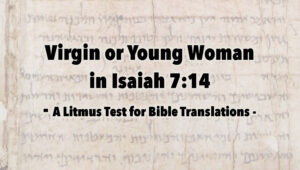Isaiah 7:14 – a Virgin Birth Prophecy?
 Isaiah 7:14 – the translation of one word, `almah, is the cause for one of the most controversial prophecies in the Bible. Jewish Bibles and a few Christian Bibles translate the word as “young woman” while most Christian Bibles translate the word as “virgin.”
Isaiah 7:14 – the translation of one word, `almah, is the cause for one of the most controversial prophecies in the Bible. Jewish Bibles and a few Christian Bibles translate the word as “young woman” while most Christian Bibles translate the word as “virgin.”
“Virgin” vs. “young woman” – those who believe that Isaiah 7:14 is a messianic prophecy pointing to a miraculous birth of a son to a virgin vs. those who believe the prophecy is a short-term prediction about a young woman, not necessarily a virgin, who was to bear a son.[1]
In the full context of Isaiah chapter 7, the prophetic sign had to be boundless and miraculous so as to exceed God’s promise to King Ahaz: “deep as Sheol or high as heaven.”
Septuagint LXX rendered only by Jewish experts translated Hebrew ha-almah into Greek as ha Parthenos meaning “the virgin.” A 1000 years later, the Masoretic text, used for the basis of Jewish Bibles, translates `almah as “young woman.”
Translation of ancient Hebrew text into English is not an exact science where there is not a word-for-word translation equivalent. Hebrew words can even serve as either a noun or a verb requiring the translator to take a more wholistic view of the text to understand the context.[3]
Key to unlocking the word definition code is to determine the intent of the speaker or writer. The meaning may not be the same as applied by the listener (or the reader or translator).
Word usage analysis can be used to decipher what is truly meant by the speaker or author. Language analysis is a more in-dept version of literary analysis that can be used to determine the intentional meaning by the speaker or author.[4]
Deciphering the meaning of `almah brings into play three Hebrew words. Lowest common denominator is the word is na`arah meaning “girl” or “young woman” where there is no specific implication of virginity.[5] Isaiah never once used the word na`arah.
Opposite of na`arah is bethulah explicitly meaning “virgin.” Appearing 50 times in Bible, the word commonly appears as a metaphor of a virgin in judgements, lamentations, or blessings. A separate category of bethulah is used in a legalistic context in the Law involving the strictest sense of a virgin.
Isaiah only used bethulah 5 times in either a metaphor or judgement of a city or nation. Since Isaiah never used the word na`arah, he did not use it with bethulah to define a female.
Next is the rarest of Hebrew words, `almah, appearing only 7 times in the entire Bible. It is a noun stemming from the Hebrew word `elem meaning “something kept out of sight.”[6]
As a standalone noun, unlike bethulah, none of the instances of `almah are used in metaphors, legalistic definitions, as adjectives or in adjective clauses;`almah does not need further clarification by an adjective or adjective clause; and `almah is never used as an adjective or within an adjective clause to define the subject.[7]
Earliest appearance of `almah is in Genesis, the only place in the Bible that contains all three Hebrew words in reference to the same female figure, Rebekah. As such, the passage in Genesis 24 makes it the codex for unlocking the meaning of these Hebrew female words.
Abraham had sent his servant back to his homeland to find a bride for his son Isaac. Beside being from his own tribe, Abraham gave the servant just one requirement: she had to willingly agree to marry Isaac – ultimately her choice.
Being in a unfamiliar land and having no idea for whom he was searching, that was a big problem. It compelled the servant to pray for a very specific sign that would leave no doubt when it happened.
Later, he recounted his experiences to Rebekah’s family and used all three of these Hebrew words, plus a forth:
Gen. 24:16 “Now the young woman [na ‘arah] was very beautiful to behold, a virgin [bethulah]; no man had known her.”
Gen. 24:43 “behold, I stand by the well of water; and it shall come to pass that when the virgin [`almah] comes out to draw water, and I say to her…”
Gen. 24:44 “let her be the woman [`ishshah] whom the LORD has appointed for my master’s son.” (NKJV)
Rebekah is first described in the servant’s story in the past tense using the combination of na ‘arah (girl/young woman) with bethulah (virgin). Her virginity is further emphasized by specifying that “no man had known her.”
Mentioned several times in the passage, Rebekah’s family included Laban. Josephus wrote in Antiquities that Rebekah viewed Laban as the “guardian of my virginity” after her father had died.[6]
Using present tense in Genesis 24:43 , the servant now refers to Rebekah by simply using one Hebrew word, hmleh or `hā-‘al-māh (the virgin). Already defined as a “virgin”, Rebekah is described by the servant as a specific virgin,`hā-‘al-māh – the same specific Hebrew word used in Isaiah 7:14.
A fourth Hebrew word provides further validation when the servant referred to Rebekah in the future tense as `ishshah, meaning “woman,” hoping she would become the wife of Isaac.[8] In this context, Rebekah would be considered a married adult woman who is not a virgin, thus the use of na ‘arah, bethulah nor `almah would be applicable nor accurate.
Comparing the Genesis codex definition of `almah as “virgin” to the other 6 uses of `almah in the Bible reveals that in all instances `almah is always used as a standalone noun in the context of a virgin in a royal context, either Hebrew or Godly. Language analysis conclusion: the meaning of `almah exclusively means “virgin” – no adjectives or further clarifications are needed or expected.
Consider this prophecy from a different perspective. If `almah is translated as “a young woman” in the Isaiah 7:14 where the state of virginity is not certain, it is not an impressive prophecy that rises to the level of God’s parameters. In this interpretation, the female subject, who may already be pregnant or will soon be and has a 50-50 chance of giving birth to a boy.
Conversely, if `almah is translated as the “virgin” who would conceive a son, it creates a miraculous prophecy where the possibility of that scenario would be unthinkable – a virgin conceiving and giving birth to a boy.
Which interpretation if Isaiah 7:14 – “young woman” vs. “virgin” – rises to the level off a boundless, miraculous prophecy?
Updated June 10, 2024.

This work is licensed under a Creative Commons Attribution-NonCommercial-NoDerivatives 4.0 International License.
REFERENCES:
[1] Isaiah 7:14. BibleHub. <https://biblehub.com/isaiah/7-14.htm> Nahigian, Kenneth E. “A Virgin-Birth Prophesy?” Skeptic Tank Files. n.d. <http://www.skeptictank.org/files/sr/2virgi93.htm> Cramer, Robert Nguyen. “The Book of Isaiah.” The BibleTexts.com. 1998 <http://www.bibletexts.com/verses/v-isa.htm> Cline, Austin. “Who Was Virgin Mary, Mother of Jesus? Was She Really a Virgin?” <http://atheism.about.com/od/biblepeoplenewtestament/p/MaryVirgin.htm> Yosef, Uri. “Isaiah 7:14 – Part 1: An Accurate Grammatical Analysis.” 2011. <http://thejewishhome.org/counter/Isa714_1.pdf> Bratcher, Dennis. “Isaiah 7:14: Translation Issues.” The Voice. 2014. <http://www.crivoice.org/isa7-14.html> The Complete Jewish Bible with Rashi Commentary. Yeshayahu- Isaiah 7:14. “Who is the Almah’s son?” Teshuvas HaMinim. 2011. <http://web.archive.org/web/20120425022737/http://www.teshuvashaminim.com/isaiah714.html> Robinson, B.A. “Isaiah 7:14 “Behold, a virgin shall conceive…”” 2007 <http://www.religioustolerance.org/chr_proi.htm> “Isaiah 7:14-Deception In The Name Of Jesus.” Agnostic Review of Christianity. 2011. <http://ihuanedo.ning.com/group/religiousskeptism/forum/topics/isaiah-7-14-deception-in-the-name-of-jesus>
[2] Net.bible.org. Isaiah 7 Hebrew text. Miller. Fred P. “The Great Isaiah Scroll.” Column VI – The Great Isaiah Scroll 6:7 to 7:15. Moellerhaus Publisher. Directory. 1998. <http://www.moellerhaus.com/qumdir.htm>Miller. Fred P. “The Translation of the Great Isaiah Scroll.” “The Translation of the Great Isaiah Scroll “Dead Sea Scrolls Bible Translations.” 2016. <http://dssenglishbible.com/scroll1QIsaa.htm> PostBarthian. image. 2022. <https://postbarthian.com/wp-content/uploads/2017/12/virgin-or-young-woman-litmus-test-bible-translations.jpg> [3] Benner, Jeff A. “Introduction to the Hebrew Bible.” Ancient Hebrew Research Center. 2013. <https://www.ancient-hebrew.org/introduction.htm>
[4] Sapir, Avinoam. LSI Laboratory for Scientific Interrogation. Language analysis courses. <http://www.lsiscan.com/id37.htm> “Scientific Content Analysis (SCAN).” Personal Verification LTD. Updated 15 November 2016. <http://www.verify.co.nz/scan.php>
[5] “na`arah <05291>” NetBible.org. 2019. <http://classic.net.bible.org/strong.php?id=05291> Mishneh Torah, Forbidden Intercourse 17.” Sefaria.org. Footnotes #48 & 49. n.d. <https://www.sefaria.org/Mishneh_Torah%2C_Forbidden_Intercourse.17.13?lang=bi&with=Navigation&lang2=en>
[6] BibleHub.com. Isaiah 7:14 Hebrew text. 2018. <https://biblehub.com/text/isaiah/7-14.htm> “5959. almah” BibleHub.com. 2018. <https://biblehub.com/hebrew/5959.htm>; “5958. elem” <https://biblehub.com/hebrew/5958.htm>; “5956. alam.” <https://biblehub.com/hebrew/5956.htm>. “`almah <5959>” Lexicon-Concordance. n.d. <http://lexiconcordance.com/hebrew/5959.html> “`elem <5956>” Lexicon-Concordance. n.d. <http://lexiconcordance.com/hebrew/5956.html>
[7] Josephus, Flavius. Antiquities of the Jews. Trans. and commentary. William Whitson. The Complete Works of Josephus. 1850. Book I, Chapter XV.2. <http://books.google.com/books?id=e0dAAAAAMAAJ&printsec=frontcover&source=gbs_ge_summary_r&cad=0#v=onepage&q&f=false>
[8]“802. נָשִׁים (ishshah) BibleHub.com. 2018. ” <https://biblehub.com/hebrew/strongs_802.htm> “H802.” Lexicon-Concordance. n.d. <http://lexiconcordance.com/hebrew/080.html#02>

 Jacob’s role in the story of the Messiah includes a specific blessing and prophecy of his own. Before he died, Jacob blessed each of his sons and foretold their future. Specifically for Judah:
Jacob’s role in the story of the Messiah includes a specific blessing and prophecy of his own. Before he died, Jacob blessed each of his sons and foretold their future. Specifically for Judah: